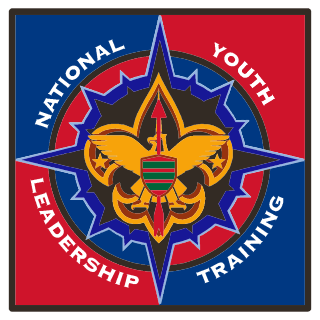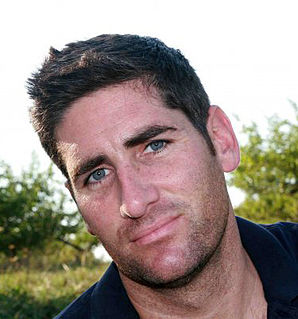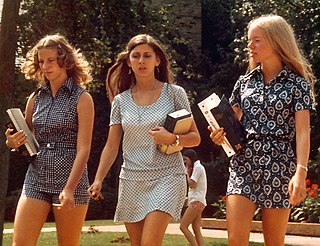
The Boy Scouts of America (BSA) is one of the largest Scouting organizations and youth organizations in the United States, with about 2.4 million youth participants and about one million adult volunteers. The BSA was founded in 1910, and since then, about 110 million Americans have been participants in BSA programs at some time. The BSA is part of the international Scout Movement and became a founding member organization of the World Organization of the Scout Movement in 1922.

The Order of the Arrow (OA) is the National Honor Society of the Boy Scouts of America (BSA). The society was created by E. Urner Goodman, with the assistance of Carroll A. Edson, in 1915 as a means of reinforcing the Scout Oath and the Scout Law. It uses imagery commonly associated with American Indian cultures for its self-invented ceremonies. These ceremonies are usually for recognition of leadership qualities, camping skills, and other scouting ideals as exemplified by their elected peers.
Advancement and recognition in the Boy Scouts of America is a tradition dating from the inception of the Scouting movement. A fundamental purpose of advancement is the self-confidence a young man or woman acquires from his participation in Scouting. Advancement is one of the methods used in the "Aims of Scouting"– character development, citizenship training and personal fitness.
Clandestine chemistry is chemistry carried out in secret, and particularly in illegal drug laboratories. Larger labs are usually run by gangs or organized crime intending to produce for distribution on the black market. Smaller labs can be run by individual chemists working clandestinely in order to synthesize smaller amounts of controlled substances or simply out of a hobbyist interest in chemistry, often because of the difficulty in ascertaining the purity of other, illegally synthesized drugs obtained on the black market. The term clandestine lab is generally used in any situation involving the production of illicit compounds, regardless of whether the facilities being used qualify as a true laboratory.

Cub Scouting is part of the Scouting program of the Boy Scouts of America (BSA), available to boys and girls from kindergarten through fifth grade, or 5 to 10 years of age and their families. Its membership is the largest of the five main BSA divisions. Cub Scouting is part of the worldwide Scouting movement and aims to promote character development, citizenship training, personal fitness, and leadership.

A variety of religious emblems programs are used by the Boy Scouts of America (BSA) to encourage youth to learn about their faith and to recognize adults who provide significant service to youth in a religious environment. These religious programs are created, administered and awarded by the various religious groups, not the BSA, but each program must be recognized by the BSA.

Venturing is one of the core programs of the Boy Scouts of America, serving young men and women. Members must be at least 14 years old, or 13 years old and have completed eighth grade, through age 21.

Sea Scouting is a program of the Boy Scouts of America for young men and women ages 14 to 20. Along with Cub Scouting, Scouts BSA, and Venturing, Sea Scouting provides a program for religious, fraternal, educational, and other community organizations to use for character, citizenship, and mental and personal fitness training for youth. As part of this training, Sea Scouts are expected to develop personal religious values, learn the principles of American heritage and government, and acquire skills that will prepare them to become successful adults.
The Boy Scouts of America (BSA), one of the largest private youth organizations in the United States, has policies which prohibit those who are not willing to subscribe to the BSA's Declaration of Religious Principle, which is usually interpreted as banning atheists, and, until January 2014, prohibited all "known or avowed homosexuals", from membership in its Scouting program. The ban on adults who are "open or avowed homosexuals" from leadership positions was lifted in July 2015. Prior to these policy changes, BSA had denied or revoked membership status or leadership positions for violation of these foundational principles. The BSA had contended that its policies were essential in its mission to instill in young people the values of the Scout Promise, or Oath, and Scout Law.
Various individuals, courts and the media around the world have raised concerns about the manner in which cases of child sexual abuse are handled when they occur in congregations of Jehovah's Witnesses. An independent 2009 study in Norway was critical of how Jehovah's Witnesses dealt with cases of child sexual abuse but stated there is no indication that the rate of sexual abuse among Jehovah's Witnesses is higher than found in general society. The organization officially "abhors" child sexual abuse, and states "the incidence of this crime among Jehovah's Witnesses is rare."

National Youth Leadership Training, often called NYLT, is the current youth leadership development training offered by the Boy Scouts of America. The program is conducted by councils over six days for Scouts, Venturers, and Sea Scouts. The program became co-ed in 2010. This training is a part of the national organization's leadership training program.

Scouts BSA is the flagship membership level of the Boy Scouts of America (BSA) for boys and girls between the ages of 11 and 17. It provides youth training in character, citizenship, and mental and personal fitness. Scouts are expected to develop personal religious values, learn the principles of American heritage and government, and acquire skills to become successful adults.
Evans v. Berkeley was a court case which upheld the right of governmental entities in California to withhold support from non-profit organizations that practice discrimination on the basis of sexual orientation.

The Boy Scouts of America (BSA) was inspired by and modeled on the Boy Scout Association, established by Baden-Powell in Britain in 1908. In the early 1900s, several youth organizations were active, and many became part of the BSA.

Learning for Life (LFL) is a United States school and work-site based youth program that is an affiliate of the Boy Scouts of America. It utilizes programs designed for schools and community-based organizations that are designed to prepare youth for the complexities of contemporary society and to enhance their self-confidence, motivation, and self-esteem, and for careers.
The Youth Protection program is a set of standards, guidelines and training developed by the Boy Scouts of America to eliminate opportunities for the abuse of youth members. All adults are required to undergo a criminal background check and to complete a Youth Protection Program training before being registered as BSA leaders and they must be re-certified every 2 years. Venture Crew leaders will complete the Venturing Leader Youth Protection training. If a Crew is also associated with a Troop, the adult leaders must complete both Youth Protection training and Venturing Leader Youth Protection training. This is a requirement fulfilling the internet recharter process. When properly implemented, the program also helps to protect adult leaders from any accusations of impropriety.
Scouting sex abuse cases are situations where youth involved in Scouting programs have been sexually abused by someone who is also involved in the Scouting program. In some instances, formal charges have been laid, resulting in specific legal cases.
Edward Leslie Rowan is a retired psychiatrist, sex therapist, active author, and Scouting leader from Exeter, New Hampshire. He has been associated with the Boy Scouts of America (BSA) for over 50 years and is a recipient of the Distinguished Eagle Scout Award (DESA) from the BSA in 1992.
The Boy Scouts of America (BSA) is one of the largest youth organizations in the United States, with 2.7 million youth members and over 1 million adult volunteers. In 1979 there were over 5 million youths in BSA.

James Dale is an American gay rights activist. He is best known for his role in Boy Scouts of America v. Dale, the landmark US Supreme Court case that challenged the Boy Scouts of America (BSA) policy of excluding homosexuals from being scout leaders.












